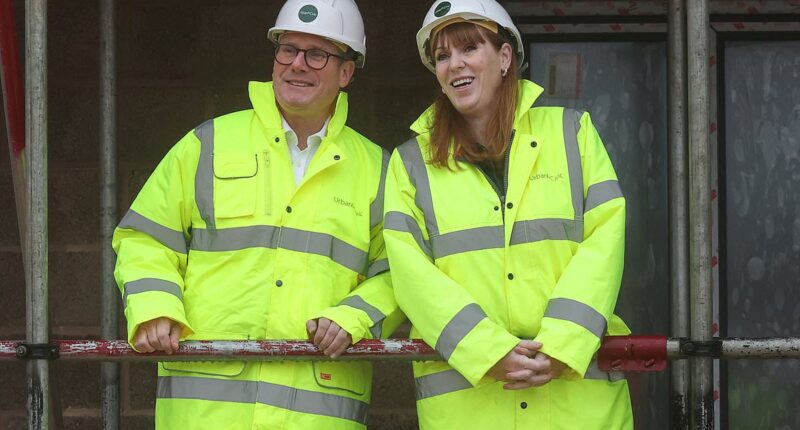Labour has been accused of trampling on local democracy after telling local councils to merge as part of a major devolution drive.
Angel Rayner is leading a significant reorganization of local services today, potentially the most extensive change to local authorities in five decades. The restructuring will involve empowering elected mayors with significant new responsibilities.
The initiative targets areas in England currently operating under a two-tier local political system, comprising a county council and a district or borough council. These areas will be required to develop plans for establishing unified authorities that will cater to approximately 1.5 million residents.
The White Paper unveiled today outlines that councils must promptly devise such plans. In cases where councils delay or fail to act, the government will intervene through a ‘ministerial directive.’ This directive will enable the government to establish ‘Strategic Authorities’ if local leaders are unable to make progress within a reasonable timeframe.
The first councils are expected to be up and running by 2027, raising questions over whether elections due to take place in May will happen for authorities soon to be junked.
Unveiling the changes in a speech in Leeds today alongside mayors including London’s Sadiq Khan, Ms Rayner, the Local Government Secretary and Deputy Prime Minister, said ‘Whitehall won’t interfere unnecessarily in local decision-making’.
This was despite personally overruling local planners in recent weeks to force through schemes for a new prison and a data centre on Green belt land.
She said the UK is the ‘most centralised’ country in Europe, with ‘too many decisions affecting too many people made by too few’.

In what may be the largest shake-up of local authorities in 50 years Angel Rayner today launched a massive reorganisation of local services that will hand major new powers to elected mayors.

Serious government: The White Paper, published today, sets out that if councils drag their heels over doing it, change will be forced upon them via a ‘ministerial directive’

In a speech to regional leaders, the Deputy Prime Minister vowed to push power out of Whitehall and into the hands of people with ‘skin in the game’ across a range of policy areas including housing.
‘In micromanaging by central government and short-term sticky-plaster politics, you’ve got a doom loop of real problems going unaddressed in Britain’s regions. And there’s huge potential that’s unrealised.’
A Conservative Party spokesman said: ‘Under the last Government devolution was extended across England, and councils which wanted to unitarise were supported to do so.
‘Angela Rayner’s announcement is part of a plan by Labour to strip councils of their powers to make choices and to impose reorganisation from Westminster without local consent.
‘The Conservatives delivered over one million new homes in the last parliament, and whilst we recognise the need to build more, these must be in the right places.
‘This new announcement will do nothing to solve that – and instead open up another front on Labour’s assault on the countryside.’
However, Lord Houchen, the Tory elected mayor in Tees Valley, said the changes were a ‘real step in the right direction.’
He told Politico’s London Playbook: ‘Some will be frustrated it hasn’t gone further, but devolution is a journey — and whilst it might take time, it’s a one-way street.’
Essex, Kent, Surrey and Hertfordshire will be among the counties set for changes to the way they are run, with the promise of more powers and money from Whitehall.
Norfolk and Suffolk will also be restructured, with their district councils being abolished and merged into new unitary authorities.
Around ten areas of the country are open to the reforms and will be part of the first wave of overhauls.
The proposed changes, in the English Devolution White Paper, will also transfer more powers to regional mayors around planning and transport.

Unveiling the changes in a speech in Leeds today alongside mayors including London ‘s Sadiq Khan , Ms Rayner, the Local Government Secretary and Deputy Prime Minister, said ‘Whitehall won’t interfere unnecessarily in local decision-making’.

Lord Houchen, the Tory elected mayor in Tees Valley, said the changes were a ‘real step in the right direction.’
A network of councils warned that plans to reorganise local authorities could create ‘mega councils’, while a think tank raised concerns about the risk of creating ‘mini Whitehalls’ by focusing on strategic authorities and abolishing district councils.
In areas with two-tier local governments, county council areas are subdivided into independent district councils. There are 164 district councils in England.
The District Councils Network warned of the risk of removing localised decision making.
‘We’re concerned that any creation of mega councils will prove the opposite of devolution, taking powers away from local communities, depriving tens of millions of people of genuinely localised decision making and representation,’ councillor Hannah Dalton, vice chairwoman of the network, said.
She said there was little evidence that such reorganisations had saved money in the past.
Simon Kaye, policy director at think tank Reform, said the White Paper was a ‘welcome start’ but that strategic authorities needed wider powers, including the ability to raise taxes.
He added: ‘There is also a risk that plans to abolish district councils will leave local neighbourhoods feeling even more neglected. The result of reforms cannot be simply the creation of ‘mini Whitehalls’ at a regional level – communities need a real say.’
Downing Street has said devolution plans aim to give more powers to local leaders amid warnings that scrapping district councils could deprive people of local representation.
Asked if removing powers from district councils is actually taking powers away from local people, the Prime Minister’s official spokesman said: ‘The plans that we’re setting out today are all about giving power from Westminster to local leaders to make sure that they’ve got the levers they need to drive growth, but it’s also about having the right structures at a local level in place that means that local areas are delivering services that people care about in an efficient manner.’
The changes are also about ‘improving accountability’, he said.
‘It’s about providing more powers to those local areas so that they have got more control (of) the services in the local area, and that they’re able to drive growth.’
He added that local elections planned for May will only be delayed at the request of councils that want to reorganise under devolution plans ‘to the most ambitious timetable’.
‘For elections to be postponed, this will only take place when necessary at the request of the area in question, and we would only be willing to consider this where there is a clear commitment to progressing reorganisation and devolution to the most ambitious timetable,’ the Prime Minister’s spokesman has said.
The assumption is that all elections will go ahead, he said, but could not give a deadline for when councils would need to decide whether to hold a local election.
‘When it comes to the precise timetable we’re obviously going to be working with local areas.’
Jim McMahon, the local government minister, said he would set out the detail of that this afternoon in Parliament when asked if all local county council and unitary authority elections due to take place in May would go ahead.
He told LBC: ‘At the moment, the assumption is that elections are going ahead. However, it’s usual in a process of reorganisation, that when a council makes a request for reorganisation, that if there are elections taking place, to a council that essentially won’t exist within the term of those elections, then you hold off the elections and you elect to a shadow body and the shadow body basically is a form of the new councils that will follow.’
Some local authorities have already requested reorganisation, he said.
Asked if some local authorities would be closed or merged, he said: ‘That’s the nature of reorganisation.’
There will be a statutory consultation before any authorities are changed, he said.
‘This is about local areas coming to government to say: ‘We want to be part of this devolution agenda. We want reorganisation as part of that,” he said.

















